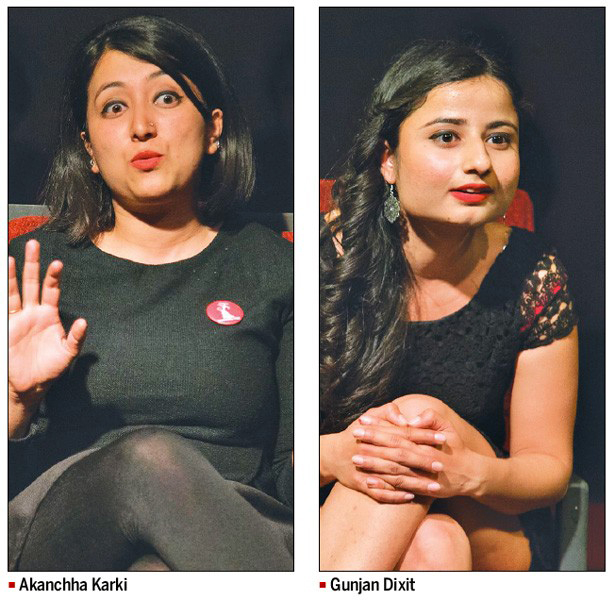Kathmandu, March 4, 2017: The Vagina Monologues is an episodic play where female performers recount tales of their sexuality—in turn, speaking to the joys and the pains of being a woman. The play, first staged in 1996, emerged as an outbreak feminist movement and is now staged in over 140 countries around the world, including in Nepal. After a successful event last year, Katha Ghera, a Kathmandu-based group of theatre enthusiasts, is organising the second edition of the show, adapted into Nepali as Yoni ka Kathaharu, this Wednesday at Trisara in the Capital. Timothy Aryal sat down with Akanchha Karkiand Gunjan Dixit, co-directors of the play, to talk about the upcoming event, its motives and goals. Excerpts:
What is Yoni ka Kathharu?Â
Akanchha: It’s a compilation of stories, real stories of lots of women of various walks of life, first compiled and formatted into a play by American women rights activist Eve Ensler. First staged as an episodic play in 1996, it started as an outbreak feminist movement and spread throughout the world. What inspired us to adapt it into Nepali was the prevalence of taboos and stigmas attached to women’s sexuality in Nepal. We wanted to use it as a platform to explore ourselves, to broaden our own knowledge, than as any kind of movement. Once we staged the play last year, we were astonished to receive a broad range of comments and criticisms, which at once disappointed and encouraged us to continue the show. Looking at how limited the perception regarding the exploration and sharing of women sexuality is among Nepali men, we were compelled to continue; we were driven by the same things which disappointed us.
This year, the acts are more or less the same; only that we have tried to include performers representing more Nepali women. Also, we have tried to make the dialogues a little more colloquial so as to make them understandable to all; the acts feature both English and Nepali languages, so we could share our stories with more people.
What process went into adapting the original and contexualising it for Nepali audience?Â
Gunjan: There obviously are many dissimilarities between the country it was first staged in, that is the US, and Nepal. But as we went through production, we realised that being a woman was a shared universal experience. The women in Nepal have been touched, harrassed and abused as have the women in America.
While rehearsing, we also found out shocking facts among ourselves, for example, married women didn’t have a clue about orgasm, would you believe it?Â
The show features about 10 acts, both solo and group, where we will share and enact our stories, using theatrical techniques so as to render them more powerful. To suit the Nepali audience, we’ve tried to use ordinary language and have remodeled some parts of the original.
For a still conservative society like Nepal, the show comes with ample shock value. Do you have to tone down the rhetoric?
Akanchha: Yes, definitely. Due to the difference in the use of language and between the culture in which the play was written in and here in Nepal, we had to tone down the language and make it palatable. For example, there are still many women in Nepal who don’t have a clue about tampons; we have used the tampon itself and used expressions such as “tampon na syampon†so as to infuse some Nepalipan into the play. Otherwise, the stories are uncensored and we have tried to be as truthful to the stories as possible.







